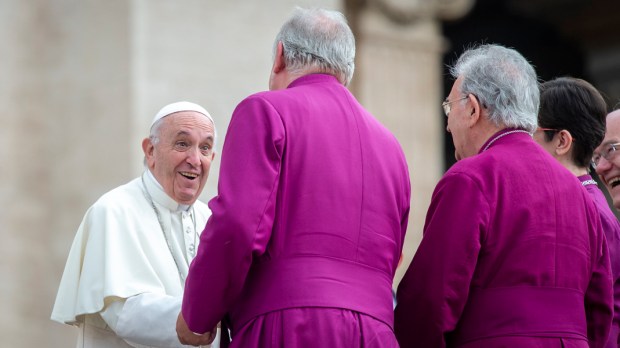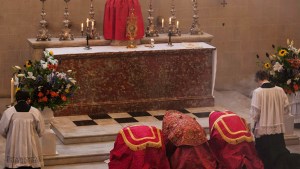Two Christian churches that share much in common are the Church of England and the Roman Catholic Church. More generally they can be called Anglicanism and Catholicism.
The Anglican tradition has its roots in the Catholic Church, but has several key differences in its beliefs. (Note: This article only concerns Anglicans who are not in communion with the Catholic Church, not those part of the Anglican Ordinariate.)
Leadership
The first difference between the two traditions is the recognition of leadership. Anglicans are part of a “communion” of churches and don’t have a central authority. Generally speaking, the Archbishop of Canterbury is considered the “first among equals” and the English monarch still retains a symbolic role.
Catholics firmly hold-up the authority of the pope, who is the successor of St. Peter. Anglicans do not recognize that authority.
Eucharist
While both Anglicans and Catholics use similar terminology regarding the Eucharist, they do not share the same beliefs.
The Catholic Church teaches a dogma called “transubstantiation,” which the Catechism explains thus: “By the consecration of the bread and wine there takes place a change of the whole substance of the bread into the substance of the body of Christ our Lord and of the whole substance of the wine into the substance of his blood” (CCC 1376).
This means that while the appearances of bread and wine remain, the substance is changed (through the power of God) completely to the body and blood of Christ.
Anglicans have a variety of beliefs, but have historically rejected transubstantiation. According to the Anglican Compass, Anglicans “affirm that the bread and wine are his body and blood in a spiritual manner, and then to qualify that, although the meal is heavenly or spiritual, it is nonetheless a true partaking of the body and blood of Christ.”
The Eucharist is not substantially changed, but only “spiritually” changed, and hinges on the reception of communion. Jesus’ presence does not remain and there is no adoration of the host.
Priesthood
Among the key differences between the two traditions are beliefs about the priesthood.
Many Anglican churches are open to both men and women being ordained priests.
The Catholic Church affirms that only men can receive the sacrament of Holy Orders.
Other differences
Depending on the Anglican church, there could be any number of differences, such as teachings on divorce and marriage, or other issues of morality.


